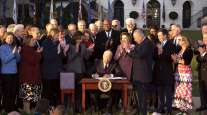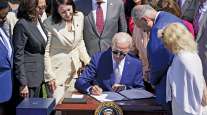Senior Reporter
IIJA’s Implementation Raises Concerns, Draws Praise at Senate EPW

[Stay on top of transportation news: Get TTNews in your inbox.]
More than a year after a $1 trillion infrastructure law was enacted, the Republican leader on the U.S. Senate highway policy panel revisited her concerns related to funding guidance from the U.S. Department of Transportation.
Sen. Shelley Moore Capito (R-W.Va.), ranking member on the Environment and Public Works Committee, again took aim at certain guidance documents unveiled by agencies throughout the department.
A focus of her concerns is a Dec. 16, 2021, memorandum from the Federal Highway Administration which suggests state agencies prioritize maintenance of projects over proceeding with new projects.
Capito shared her input linked to the Infrastructure Investment and Jobs Act during a hearing Nov. 30. Most of her Republican colleagues have endorsed a strict interpretation of the IIJA instead of their interpretation of the memo’s “fix it first” approach to infrastructure projects.
“Certain members of this committee have called on FHWA to stop pursuing policies that outright contradict the IIJA statutory text,” Capito told colleagues. “FHWA should instead more expeditiously work to implement all provisions of the law as written.”
To pre-emptively address infrastructure concerns, pursue preventive maintenance and repair existing projects were central to senior Democrats and Biden administration officials negotiating IIJA provisions. Democrats also have suggested the FHWA memo is meant to be viewed as guidance for state agencies about federal resources. Top Democrats also point to the law’s potential for increasing highway safety, responding to climate change and improving freight connectivity.

Carper
As Sen. Tom Carper (D-Del.), the panel’s chairman, observed: “Our infrastructure programs could help reduce emissions from our transportation sector, a sector that accounts for nearly 30% of greenhouse gas emissions nationwide. New programs could also improve the resilience of our transportation systems and reduce our vulnerability to extreme weather, such as the heat waves and flooding we continue to witness across our country and planet.”
The chairman noted federal data estimating nearly 43,000 traffic fatalities in 2021. That marked a 10.5% increase from the prior year, according to the National Highway Traffic Safety Administration.

Buttigieg
The administration, tasked with implementing the IIJA, has emphasized programs prioritizing highway safety. During the law’s anniversary in mid-November, Secretary Pete Buttigieg highlighted the issuance of a national roadway safety strategy.
“Humans make mistakes, and as good stewards of the transportation system, we should have in place the safeguards to prevent those mistakes from being fatal,” the secretary indicated in a statement included in the safety strategy. “Zero is the only acceptable number of deaths and serious injuries on our roadways.”
At the Nov. 30 EPW hearing, David Bauer, CEO of the American Road and Transportation Builders Association, highlighted economic benefits expected to impact the transportation sectors. Under the IIJA, billions of dollars in discretionary grants will be awarded to state agencies.

Bauer
“The key takeaway from the first year of the IIJA is that the law is working as intended, with state transportation departments disbursing their funds and projects breaking ground in communities across America,” Bauer said. “A virtue of the multiyear surface transportation reauthorization is the economic benefits that will follow project completion — be it increased state and local tax revenue, local job creation or a boost to household income — are only set to compound from where we are today.”
Jonathan Levy, chief commercial officer with EVgo, expressed optimism about the infrastructure law’s aim to expand electric vehicle infrastructure nationwide.
“The committee should be commended for its work on [the bipartisan infrastructure law], which will spur innovation and investments necessary to enable a competitive private market for [electric vehicle] charging to flourish over the coming decade,” Levy said. “This competitive market, and ensuing investments, will be seen across 50 states, fueling job creation in jobs such as EV technicians, electricians, construction and more.”
Want more news? Listen to today's daily briefing below or go here for more info:




